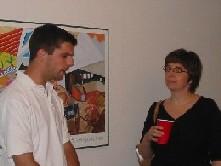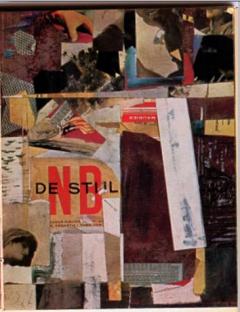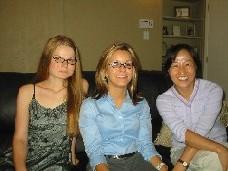|

Reception after the 2004 American Studies Distinguished Lecture Series
|
|
|
|
Challenges in the Revision Process Over
the past year of curriculum revision, forty courses were revised,
cancelled, or developed. Several interest groups procured funding for
speakers in the field, began holding works-in-progress seminars, and
formed reading groups. Applicants to the program identify fields of
study based on the website and are directed to appropriate faculty and
courses. Some
problems remain. The interest groups that already had a strong faculty
and graduate student representation prior to revision are still active,
but smaller groups convened by curriculum revision are inactive. And
although the project was initially conceived to benefit graduate
students, but it has been difficult to inspire graduate student
participation. Some
questions to consider as we continue our revision process are what
these intellectual communities and their activities (lectures,
colloquia, etc.) do for our department, and for individual members of
our community, and why graduate students are hesitant to become
involved.
|
|
|
Highlight: Discourse Studies The Discourse Studies group
pursues questions about the role of language in such issues as how
individuals form social identities, how stereotypes get perpetuated,
how writing influences thought, how rhetorical traditions accommodate
change, how literary cultures account for nature, how stories advance
arguments, and how poems embody diverse voices. The concentration in
discourse studies at Texas A&M draws upon rhetoric and composition,
linguistics, literacy studies, ethnography of communication, and
literary scholarship for its methods and research topics.
|
|
|
|
Creating Intellectual Communities: Pathways to Revision Our
initial goals were to revise the graduate curriculum to better reflect
current academic work in literary studies and the research of our
faculty; to create concentrations for graduate students that would help
them develop a field of specialization; and to link the intellectual
work of the classroom with reading groups, works-in-progress seminars,
and campus lectures.
|
|

Kurt Schwitters, NB, 1947
|
|
|
|
Process Builds Community We identified existing working groups and convened new groups in recognized areas of faculty and student interest.Faculty
met in the groups of their interest, defined the requirements for the
concentration, and proposed changes to the curriculum in each area.After
reviewing the proposals from each group, the Graduate Studies Committee
(GSC) found ways to make the requirements and definition of each
concentration consistent. The GSC also asked the groups to contribute
brochures, website material, and other information to use in advising
and recruiting students for the concentrations.The
faculty groups met again to finalize their concentration plans, develop
new courses or revise/cancel existing ones, and to draft sample course
descriptions and syllabi.The
new curriculum was presented to the GSC, and then to the faculty as a
whole for suggestions and ratification. It appears in the 2004-5 University Catalogue.
|
|
|
Reverberating Effects: Graduate Student Involvement Our
initiative to build community includes expanding the role of graduate
students in governing the department. This year the English Department
is hiring four new faculty, and graduate students will serve on the
search committee, review the files, attend all presentations, and
submit a collective recommendation to the faculty.
|
|
|

Graduate students at the departmental fall gathering
|
|
|
|
Future (Re)Visions Our
theme for this year's work on the CID, "Building Inclusive Intellectual
Communities," seeks to expand the curriculum revision project by
fostering a stronger sense of collaboration between faculty and
graduate students. One group is designing and implementing a colloquium
on teaching specializations in English. Another is working to expand the opportunities for graduate students to share their work with other department members.
|
|
|
Highlight: New Modern British Studies The New Modern British Studies Group
is an informal group of faculty and graduate students working in
British, Irish, and Postcolonial literary, historical, and cultural
studies from the eighteenth century to the present. Since the group
began meeting in fall 2001, its members have organized an ongoing
faculty colloquium series, held reading group discussions of work by
scholars in modern British studies, brought visiting scholars to campus
for public lectures, and supported a one-day symposium, Curious Things.
|
|
|